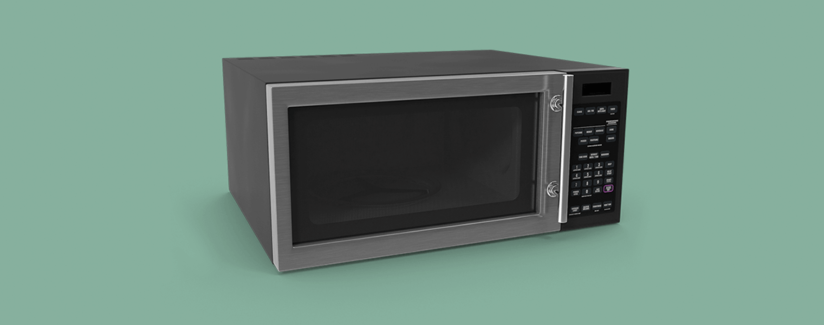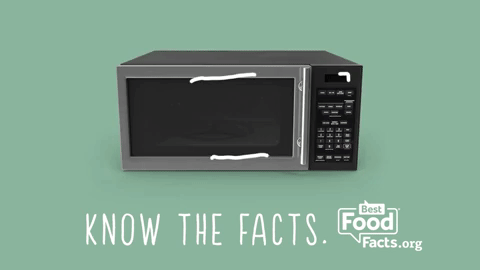
Is Microwave Cooking Safe?
Microwaves make cooking easier and help save time in the kitchen. However, is using a microwave to cook food safe? And, are there any dangers associated with microwaving food? To address these concerns, we reached out to Francisco Diez-Gonzalez, Ph. D., professor and director of the Center for Food Safety at the University of Georgia.
First off, is microwaving food safe?
Dr. Diez- Gonzalez: “Yes. There is very little evidence that microwaving itself poses any risks. The only potential risk resulting from the uneven distribution of heating that creates pockets of low temperature is the survival of pathogenic organisms. This has been illustrated with a number of raw frozen chicken entrees which have caused salmonellosis cases due to the lack of thorough heating.”
In addition, Dr. Diez- Gonzalez says that there are certain types of containers that are not safe, or recommended to microwave. These types of containers include:
- Metal containers
- Some soft plastic materials
- Paper plates
- Cardboard
The best types of containers to microwave are ceramics and glass.
Does microwaving food cause any loss in nutritional value?
Dr. Diez- Gonzalez: “Similar to other types of food heating, microwave can also lead to a small reductions in vitamin content. However, the rapid microwave heating is less detrimental to labile nutrients than conventional heating.”
How hot does a microwave get? Does it cook my food to safe levels?
Dr. Diez- Gonzalez: “A microwave does not heat itself. The microwave heats the materials placed inside of the microwaving chamber. The food can reach boiling water temperatures depending on its composition. Liquid foods can get to safe levels because they can be shaken and the temperature can be homogeneous. However, solid foods may not be evenly cooked and there may be some small portions of surviving pathogenic cells.”
Are there any foods that should not be microwaved?
Dr. Diez- Gonzalez: “Yes, there are a number of dry foods that may catch fire when microwaved.”
Some additional items that should not be microwaved include dry pastas, fruit, hot peppers and processed meats.
When it comes to using microwaves, food safety is not the only factor that makes people hesitate to use microwaves. Human health and safety is another factor at play.
What happens if I stand too close to the microwave when it is operating?
Dr. Diez- Gonzalez: “Nothing, given the current standards of manufacturers the amount of radiation leaking from a typical household microwave is extremely small and it is negligible to cause any health risk.”
I’ve heard that microwaves emit harmful radiation. Is that true?
Dr. Diez- Gonzalez: “The type of radiation that microwaves emit is harmless as long as the microwave oven is operated according to its design. Manufacturers of household microwaves have built in safety measures to contain the radiation within the instrument.”
In summary, yes, microwaves do emit some level of radiation. But according to the Washington Post, this level of radiation is nothing to worry about. “To put things in perspective, your laptop, cordless phone and cellphone all leak electromagnetic radiation, too.”
The article goes on to discuss how the Food and Drug Administration (FDA) sets guidelines and regulations to ensure that microwaves are safe to use.
“The Food and Drug Administration has strict limits on the amount that can leak from a microwave oven throughout its lifetime, and it is far below the amount known to harm people. Part of the requirement is that the appliances are built with double ‘interlock’ systems that stop the production of microwaves as soon as the latch is released. … The level of normal exposure also drops dramatically as you move away from the oven — so, to be extra cautious, simply stand away from it while it’s on. Microwaves turn on and off like a light bulb: when they are off, no waves are emitted, and microwave energy cannot linger in the oven or in food.”
An additional question we received from one of our staffers pertained to new moms.
Here’s a concern with moms – is it okay to microwave baby bottles?
Dr. Diez- Gonzalez: “It’s a little different if you are referring to heating the formula in the bottles or to microwave the bottles for disinfection purposes. If the former: first check with the manufacturer that the bottle material is microwave compatible and after heating the formula, make sure to shake well because of the uneven distribution of heat during microwave and the potential for hot spots to scald the baby.”
Overall, microwaves will continue to have a special spot in our kitchens. They are great for producing food in a quick manner and help preserve some nutritious parts to fruits and vegetables.



























